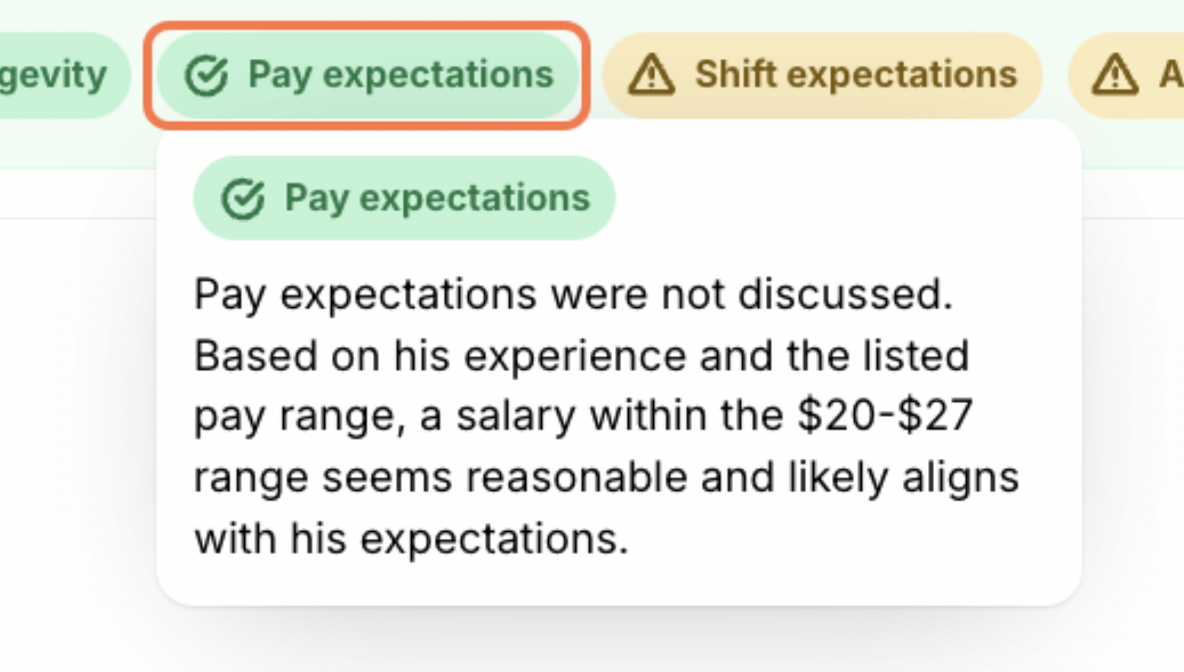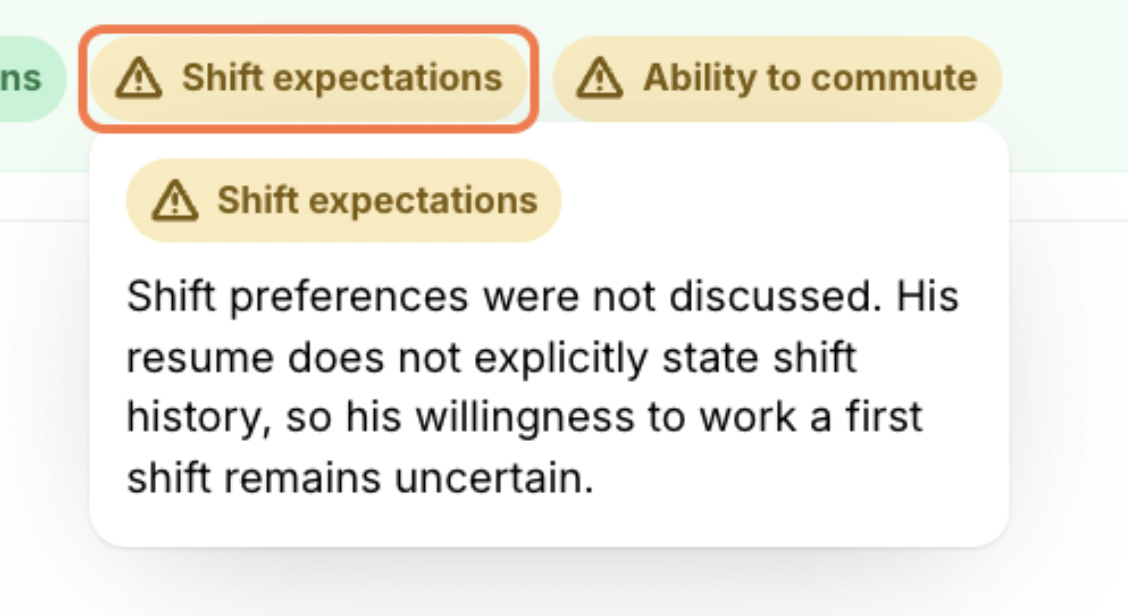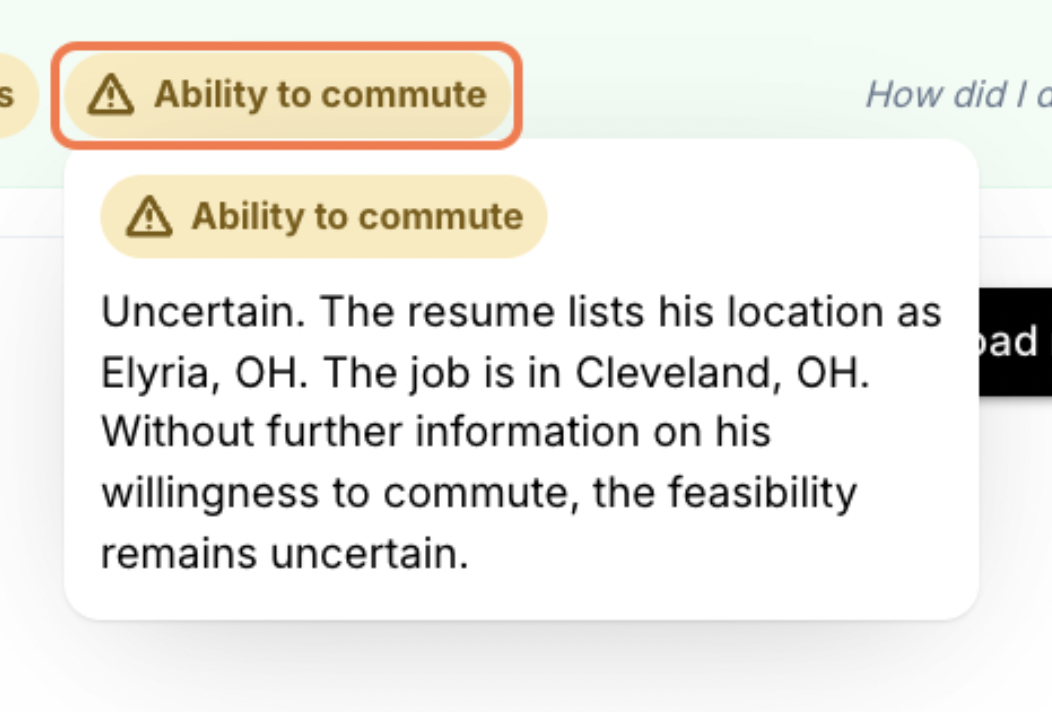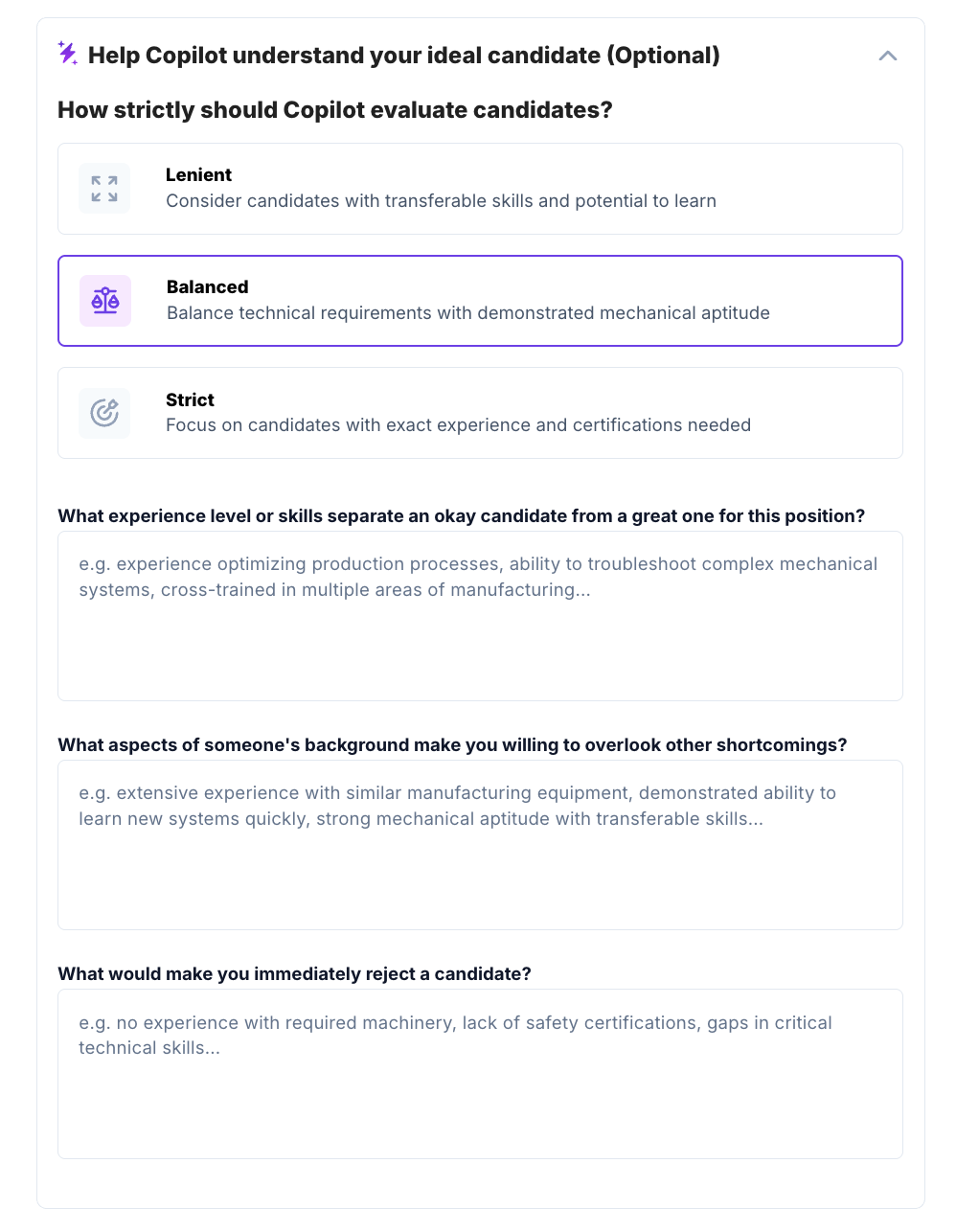How Copilot Evaluates CandidatesUpdated 14 days ago
Related Articles: How to configure your company overview for enhanced Copilot performance, Teach Copilot how to evaluate candidates
Overview
While traditional recruiters are managing their inboxes, FactoryFix's Copilot is methodically evaluating candidates using a rigorous approach similar to an experienced manufacturing hiring manager, enhanced by your direct input. This AI-powered evaluation helps determine if a candidate is a strong match for your role, saving you time and surfacing top talent. Here’s how Copilot thinks about each candidate:
What Copilot Considers
Copilot analyzes multiple facets of a candidate's profile and your specific requirements:
Recent Relevant Experience (Key Factor)
Copilot places the heaviest weight on what candidates have done in the last approximately 5 years. Recent, relevant experience is often the best predictor of success. For example, when evaluating a maintenance technician candidate, Copilot will value their current experience troubleshooting Allen-Bradley PLCs more heavily than similar work they did 8 years ago.

Technical Skills & Knowledge
For each required skill in your job posting, Copilot:
- Evaluates demonstrated experience level
- Considers how recently they've used the skill
- Factors in relevant certifications and training
- Looks for supporting evidence in both resumes and screening conversations
Copilot is manufacturing-focused, so it understands the difference between someone who can "use" a CNC machine and someone who can actually program one. It won't be fooled by vague claims or keyword matching.
Environment & Culture Fit
Copilot analyzes whether candidates have worked in similar manufacturing environments by looking at:
- Industry sector alignment (e.g., automotive, food processing)
- Production process similarities
- Operational scale match
- Physical demands and safety requirements
Career Stability
To assess likelihood of long-term fit, Copilot examines:
- Average tenure in recent roles
- Any concerning patterns of frequent job changes
- Gaps in employment history
- Current employment status
- Stated reasons for seeking new opportunities

Practical Success Factors
Copilot evaluates real-world factors that often determine success:
- Commute feasibility based on location
- Shift compatibility with past experience
- Pay expectations versus role requirements
- Ability to meet physical demands
- Required certifications or clearances



Help Copilot Screen and Evaluate
Your Company's Unique Context
Copilot incorporates information you provide in Settings > Company Overview. Details about what your company builds/offers, your competitors/differentiators, and your company description for candidates help inform the evaluation, leading to assessments that better reflect your company's unique environment.
Your Custom Evaluation Guidance (Crucial for Accuracy)
You can directly teach Copilot how to evaluate candidates for each specific job. During job posting (in the "Teach Copilot how to evaluate candidates" step), you can provide:
- How strictly should Copilot evaluate candidates?: Set the overall strictness level ("Lenient," "Balanced" (default), or "Strict").
- Ideal Candidate Definition: Describe what experience or skills separate an okay candidate from a great one.
- Overlook Factors: Specify aspects (e.g., specific certifications, unique machine experience) that make you willing to overlook other shortcomings.
- Dealbreakers: Clearly state what would make you immediately reject a candidate (e.g., lack of a specific license, unwillingness to work a required shift).
Copilot uses this input directly in its scoring, leading to evaluations more aligned with your true priorities.

Previous Interactions
If a candidate has applied to your company before, Copilot considers:
- Past roles they've applied for
- Previous screening results
- Interview outcomes
- Quality of past interactions
How Copilot Provides Its Assessment
For each candidate, Copilot:
1. Builds a complete picture of their capabilities from their resume, screening responses, and your custom guidance.
2. Compares their recent experience and skills against your specific requirements and ideal candidate profile.
3. Evaluates practical factors and dealbreakers you've defined.
4. Provides its assessment as:
- A 1-5 star rating.
- A written assessment blurb in the candidate's conversation thread, summarizing the rationale, highlighting strengths, and weaknesses relative to the job and your criteria. (Scores of "N/A" indicate Copilot did not perform an evaluation for that specific application, e.g., for manually added candidates).
What Makes Copilot Different
Unlike traditional applicant screening systems that rely on keyword matching or generic assessments, Copilot:
- Understands manufacturing-specific requirements and terminology
- Evaluates candidates the way an experienced hiring manager would
- Adapts to your specific needs and requirements
- Provides clear, evidence-based explanations for its recommendations
- Gets smarter over time through feedback
Best Practices for Working with Copilot
To ensure Copilot provides the most accurate and helpful candidate assessments:
1. Be specific in your job description and skill requirements. Clearly list necessary certifications, equipment models, and technical knowledge.
2. Utilize the "Teach Copilot how to evaluate candidates" fields during job setup. Define your ideal candidate, what you're willing to overlook, and absolute dealbreakers. This is key to tailored evaluations.
3. Fill out your "Company Overview" in Settings. This gives Copilot valuable context about your business.
4. Review Copilot’s detailed assessment blurbs. They often contain valuable insights into why a candidate was rated a certain way.
5. Provide feedback on Copilot's assessments using the "thumbs up/down" icons. This directly helps the AI learn and refine its understanding of your specific needs for future evaluations.

6. Trust but verify. While Copilot is a powerful assistant, always use your professional judgment in final hiring decisions.
Remember: Copilot is designed to handle the time-consuming parts of candidate evaluation, equipped with your specific guidance, so you can focus on interviewing and hiring the best talent for your team.